
MEMORIES OF WAR
KNOCKMORE SELECTED AS PLACE OF SAFETY FOR FAMILY
Neil Greenlees talks to survivor David Sloan
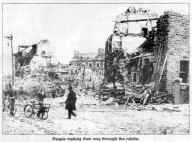 |
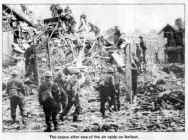 |
Derriaghy man recalls the blitz on Belfast
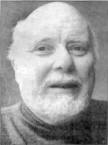
TODAY (Friday April 6) and next Sunday (April 15) mark the 60th anniversaries of two of the main air raids on Belfast during the Second World War.
Numerically, other cities in the United Kingdom suffered more frequent and prolonged attacks.
But at the time of the second raid which took place on Easter Tuesday only London and Liverpool had suffered greater casualties in one night.
Derriaghy man David Sloan can remember both bombardments vividly.
As a young boy he viewed the first from the relative safety of the Knockmore area of Lisburn to which he, his mother and grandmother travelled each afternoon from their home in the Sandy Row area of the city.
However, the family did not leave Belfast on the night of the second raid and experienced the full horror of all out war as high explosives and incendiaries rained down around them.
To commemorate these terrible events Mr. Sloan has recalled his wartime experiences for the Ulster Star.
His first recollections are of how his father decided, in the wake of warnings from the Stormont Minister of Public Security Mr. J.C. McDermott, that his family should have a place of safety to go to in the evenings.
"ON his one day off in the week he worked a night shift in the Co-operative Bakery in East Belfast, then he got on his bicycle and headed for the country.
"Finaghy, Dunmurry, Derriaghy were passed as not far enough away and he sought a place of safety in Lambeg.
"He had no luck here as all the houses were full of the Belfast commuters years before this term was used for daily travellers from the city.
"Through Lisburn with its factories and mills he proceeded and up Longstone Street. He turned left and up the Ballinderry Road.
"A turkey farmer on the right hand side apologised, gave him a chicken, and said that his house was full.
"On his recommendation my father proceeded up the road and turned left into Knockmore Lane. It was then an unsurfaced lane leading to the Moira Road. Success arrived when he inquired at the last house in a block of what I still call railway houses. Square solid red brick with a porch.
"They had a large living room; a good or Sunday parlour; a scullery and three bedrooms upstairs.
"Tom Culbert, a small farmer, lived there with his wife and young son Henry and he agreed to let our family have accommodation at nights.
"I never heard what the cost was but I am sure it was minimal at to-days rates. My father cycled home and told my mother, my grandmother and me the news of our forthcoming refugee status and relocation.
"My memories start with my first taxi ride to Knockmore and
how we lost our way and ended up in the Causeway End Road.
Goto Top
"The Culbert's house was much bigger than ours and their garden with gooseberry bushes; chicken and newly mown hay was a wonderland with new smells, sounds and adventures.
"No hidden garden but the locked Sunday room was a challenge.
"The curtains were always drawn so I had to wait for a Sunday to discover its mysteries.
"We travelled, each weekday at 4pm from Bradbury Place by buses with strange names, Filter Beds, Aghagallon, Ballinderry, etc.
"We took our tea with us but we were in receipt of generous supplies of chicken, eggs, vegetables and milk.
"A doctor's recommendation resulted in me having to drink goat's milk for my health. We eventually stayed over a weekend and I entered, with stern warnings, the Sunday Parlour.
"Here was a relic of the Victorian era. Horse haired upholstered settee and chairs, a dark oak dresser with valued china; heavy velvet curtains and a polished wooden floor with a rug on it.
"There was a time warp. 1941 stopped outside and time went backwards. It smelt of camphor and a peculiar musty odour, which emanated from a pile of red paper-backed hymnbooks.
"A large picture of the broad and narrow way to Heaven and showing the horrors of Hell witnessed to the evangelistic beliefs of the family.
"This extended to the belief that knitting on a Sunday was sinful as my mother was to learn to her cost.
It was a Sunday night I saw my moon. It was a new one which I saw when I was called in for mv'tea'. As usual for a Sabbath it was a quiet one and I was taken up stairs but sleep wouldn't come.
And after some pleading I was allowed downstairs to warm myself at the fire in the warm glow of the oil lamps.
"I fell asleep and was wakened by the sound of loud voices. The fire only lighted the room; the lamp had been turned out, and I was frightened.
"I asked what had happened and my mother lifted me wrapped in a rug and took my up to the landing where everyone else has standing at a window which had its black heavy curtain pulled back.
The sky was brightly lit with an orange glow and the silver moon of earlier was now a reddish hue. I thought of Hell's picture in the Sunday Parlour and of a poem we were learning at school, 'some moment when the moon was blood...'
Had the world ended? "Look" said my mother, "Look at Belfast its in flames. It's the Blitz. I hope your father's all right."
"Father was safe although he missed being killed by a bomb if he had gone home his usual way.
"I though that night that I knew what a Blitz was but the next morning in devastated Belfast I extended my concept of its range.
"Thirteen people had been killed but my concept was incomplete as I was to discover ten days later on Easter Tuesday when we stayed at home and we experienced the 'Big Raid' when the Luftwaffe again visited Belfast and seven hundred were killed."
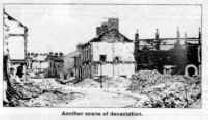 |
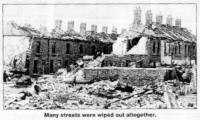 |
| Another scene of devastation. | Many streets were wiped out altogether. |
His most lasting memory of the war
MR. Sloan describes the Easter Tuesday raid as his 'most lasting memory of the war'.
He explained as a baker his father had to work at nights over the holidays so it was decided the family should miss its exodus to Knockmore that week- end and stay at home in Sandy Row.
Many people, he said, believed there would be no air raids on Belfast that e weekend for a variety of reasons.
- It was too soon after the raid on thee docks area.
- The Luftwaffe were short of fuel.
- The German pilots would be on holiday.
- The weather was against them.
"Their collective wisdom was wrong grossly wrong," he continued.
"EASTER Tuesday was dull and rainy but later the weather improved and it the clouds cleared to herald a moonlit evening.
"My night's sleep was interrupted at is twenty to eleven by the sound of the siren alarm.
My father being at work, my mother got me to go to sleep by saying that it was a false alarm.
"Her efforts were frustrated later by a bright flash of light which shone as, through a gap in the curtains and lit the darkened bedroom and wakened me.
'I pulled back the curtains and saw Aughrim Street and Blythe Street and
the whole of the area lit, from above, by brilliant white lights.
Goto Top
Next morning the streets were littered with the cartridges of these magnesium flares.
"I then heard distant explosions and now fully awake, I crept downstairs.
"The cold kitchen was in darkness, caused by the heavy blackout curtains and the empty grate.
"My granny had heard terrible stories of how the blast of bombs could travel down a chimney and cause the fire to explode into the kitchen.
"Muffled voices and the sound of praying betrayed my mother and granny's hiding place.
They were hiding under the stairs in a place reputed to be safe and which although now distempered, still smelled of its original role as a coalhole.
"My plaintive cry of 'Mammy' caused a quick rescue mission as I was snatched up and whisked into the place of safety. A candle lit the darkness and revealed two stools, a pile of blankets and rugs, and a metal trunk containing the family valuables and papers, including assurance policies.
"I was wrapped up in a rug and told everything would be all right. I closed my eyes but not to sleep - to listen to the sound of bombing outside.
"Our cat emerged from the pile of blankets and scratching and screaming in terror had to be let out into our back yard.
"The briefly opened door magnified the sound of the bombing outside.
"God help us," my granny said and my mother nodded in agreement.
"They were both wrapped in rugs and were praying and rocking back and forth like the keening women of the past.
"Both the praying and rocking stopped suddenly as we heard a whooshing sound. Silence tensely reigned. Then the landmine, which was to devastate Blythe Street, exploded.
"I remember we all screamed as we heard our kitchen being showered by the glass of our window. Then the blast reached us blew out the candle, covered us in coal dust and rendered us deaf.
For a while we sat in silence cut off from the outside by our deafness and the fear of what had happened.
"Eventually, after what seemed a long time, my mother and granny pushed open the jammed door to the kitchen. Everywhere and everything was covered or embedded with glass. The doors had been blown in and were hanging off their hinges.
"The kitchen window had gone and the silent street outside was filled with people, strange lights from incendiary, bombs and a powerful smell of burning.
"Carrying me, my mother ventured out, only for the both of us to be terrified by the noise of a fire engine racing up Blythe Street.
"Our hearing had come back, accompanied by a ringing in our sore ears.
"Noise now added to the terrible scene. There was a lot of shouting, the sound of collapsing buildings, ambulances, and a lot of people crying.
"Everyone scattered as a plane flew low overhead and the sound of machine gunning was heard.
"We went back into the house and blocked the window, lit the fire and made a pot of tea.
"The all-clear sounded at 4.55am and we waited, wrapped in blankets, for a the morning which at times we never thought would come.
The scene the next morning was unforgettable. My bed covered in the plaster from my bedroom ceiling and all our windows blown out. The lavatory in the backyard had collapsed. But we were grateful.
"Two hundred yards away, the houses on both sides of Blythe Street had collapsed. One house, of a school pal, existed only as half a house with its curtains flapping in the breeze.
"The road was blocked by coloured tape and firemen, soldiers, policemen and Civil Defence men were securing buildings and looking for survivors.
"When we went back to school there were some empty desks and we heard of families being obliterated and schoolmates being blown on top of a mill chimney.
"Our formidable Headmistress Miss Watchorn led us in prayers on the first .day.
Praise God from whom all blessing flow . . . she started, before giving thanks for the delivery of all present, from Belfast's Big Raid as it became known.
This most unprotected city in the United Kingdom has suffered its biggest raid so far. Only London and Liverpool suffered greater casualties in one night, she said.
"Years later I learnt that, on the night of the Big Raid, 695 citizens were killed and 1,500 were injured and that over 300 metric tons of bombs and eight hundred incendiaries had rained down on Belfast.
Sixty years later I still give belated thanks for the deliverance of my family and me that night. The one I thought would never end or end forever.
